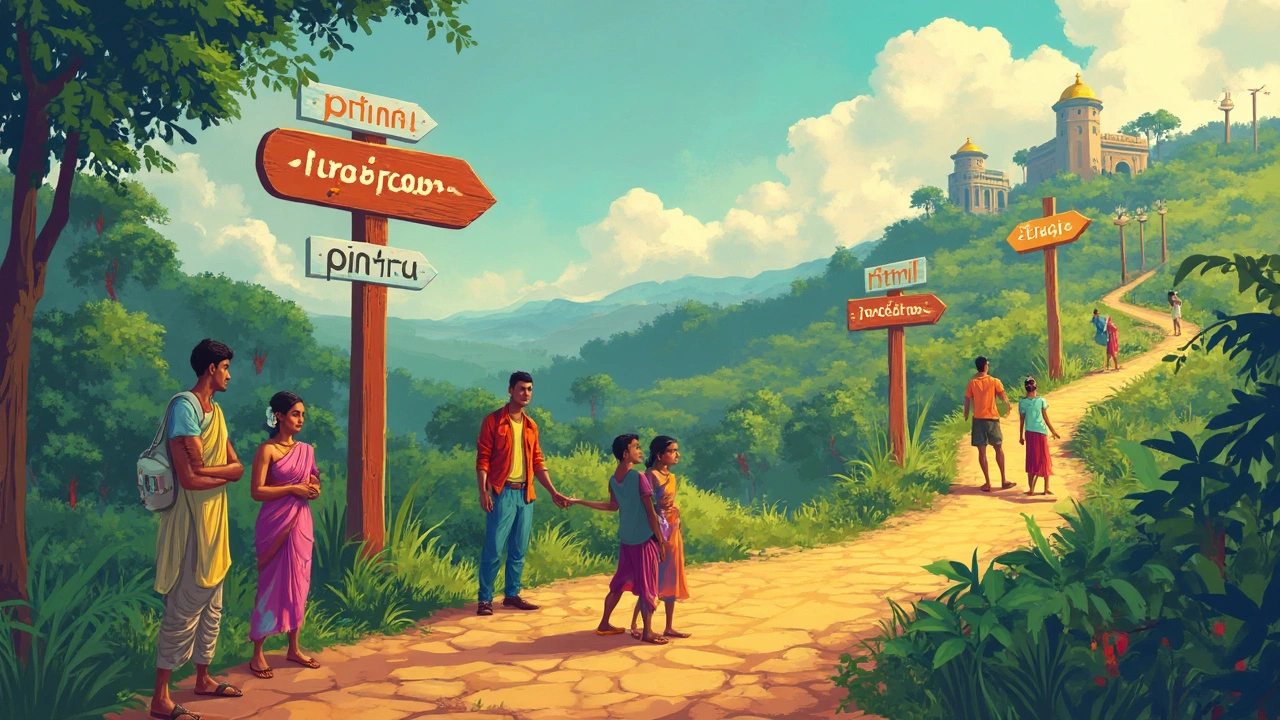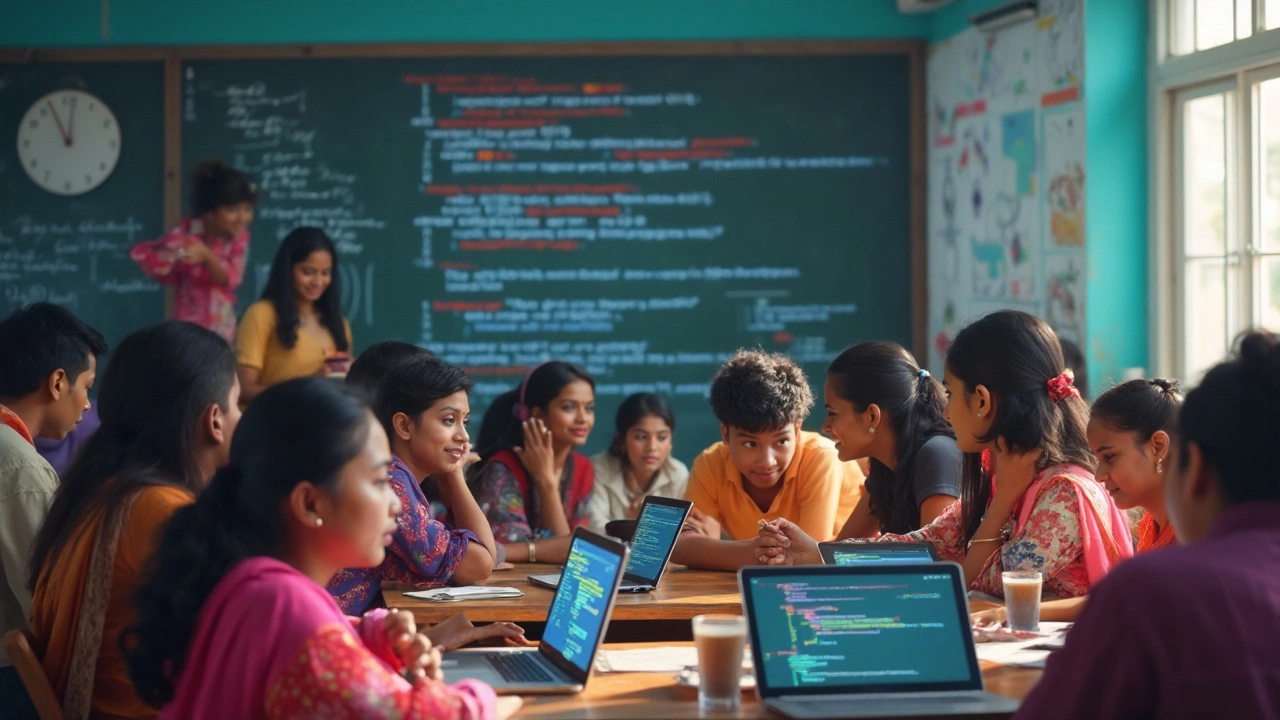Kicking off your coding journey can feel like standing at the base of a mountain, trying to decide which path to take. Newsflash: there's no 'one size fits all' answer here! Your choice depends a lot on what you want to achieve and how you like to learn.
First up, think about why you want to code. Is it for web development, software engineering, data science, or just for fun? Knowing your 'why' can point you in the right direction. For instance, if building websites excites you, then JavaScript is your go-to. It's like the paintbrush of the internet—essential and everywhere.
If you’re looking for something more general, Python is a top pick for its simplicity and versatility. It's not only beginner-friendly with its English-like syntax but also powerful enough to handle serious tasks like machine learning and data analysis. Plus, there's a massive community eager to help newbies, which makes finding resources or getting unstuck a breeze.
- Why Choose Coding?
- Popular Languages and Their Uses
- Python: The Friendly Giant
- JavaScript: The Web's Best Friend
- Getting Started: Tips and Resources
Why Choose Coding?
So, why would you even consider diving into the world of coding? Well, there's a bunch of reasons that make coding a solid skills investment for almost anybody.
First off, coding opens up a world of career opportunities. The world is becoming more digital every day, and companies need tech-savvy folks to build software, manage data, and create websites. That means learning to code could lead you to an in-demand job with a potentially hefty salary. According to 2024 data, software developers earn an average of $105,000 per year in the U.S., and that number can climb with specialized skills.
Expand Your Creativity
Think coding is just a bunch of ones and zeros? Think again. It's actually a super creative process. You get to build things from scratch—like websites, apps, and games—by writing lines of code. Plus, problem-solving becomes a puzzle you actually want to solve. The more you code, the better you get at coming up with creative solutions to complex problems.
Boosting Problem-Solving Skills
Okay, let's keep it real; coding isn't just about typing away on a keyboard. It's a mental workout. Each programming challenge you tackle helps you develop critical problem-solving skills. These are skills that are helpful no matter what field you're in, from managing a household budget to engineering a rocket.
Be Your Own Boss
Another cool thing? Knowing how to code means you can freelance or even start your own business with fewer upfront costs. All you need is a laptop and your mad coding skills. You can create your own website, develop software for clients, or even launch a startup!
Community and Collaboration
Lastly, the coding community is massive and welcoming. Whether it's forums, local meet-ups, or online courses, there's always someone willing to help you out. It's like having a built-in network of friends who speak the same language you do.
So if you're on the fence about jumping into coding classes, remember that the skills you gain aren't just about landing a job. They're about opening the door to endless possibilities and maybe even having a little fun while you're at it!
Popular Languages and Their Uses
When it comes to learning to code, picking the right language isn't just about what's hot right now. It's about matching the language to your goals. Here are some of the most popular ones and what they're best for:
Python
Python is like the Swiss army knife of programming. Whether you want to dabble in web development, machine learning, or even automation, Python has you covered. It's favored by beginners because of its simple syntax that reads almost like English. Plus, a large community and a ton of libraries make it even more appealing for newbies and seasoned coders alike.
JavaScript
JavaScript is the language that adds life to websites. If you're diving into front-end development, this is your ticket. It's what makes web pages interactive—think things like the live updates, animated graphics, and features you love in your favorite sites. And it doesn't stop there! With platforms like Node.js, JavaScript can be used for back-end development too.
HTML & CSS
Alright, technically not programming languages, but if you're going to build web pages, you'll need both in your toolbox. HTML (HyperText Markup Language) is essentially the skeleton of a website, and CSS (Cascading Style Sheets) is how you make it all look pretty. They’re the basics of web development, so almost every web developer starts here.
Java
Java has been around the block and continues to be a workhorse, especially in enterprise environments. It's used for building large systems, mobile apps, and even game development. Its object-oriented approach makes it robust, and the "write once, run anywhere" mantra makes it versatile.
Ruby
If you’re intrigued by web apps, Ruby (particularly with Rails) is worth a look. It’s known for its ease of use and speed when developing apps. Many startups use Ruby on Rails because you can build something functional with fewer lines of code compared to other languages.
The language you choose should align with what you want to do in the tech world. Remember, each language has its own vibe and community. Dive in, test the waters, and see which code speaks to you!

Python: The Friendly Giant
So, you're curious about why Python has become such a popular choice among beginners and pros alike? Well, it's not just because everyone and their grandma is talking about it. Python's user-friendly nature makes it an ideal first step into the world of coding.
The Language That's Got Your Back
Imagine learning a language that actually seems to understand your struggles. Python's syntax is clean and simple, almost like reading English. This makes it less intimidating and more approachable, unlike some other languages out there which seem to enjoy making your life difficult. You don’t need to be a seasoned programmer to start creating useful projects.
Python's Versatility
What do web development, data analysis, AI, and video game development have in common? You guessed it—Python can do them all. This language is like that Swiss Army knife you always wanted as a kid. It can handle a variety of tasks, so whether you're looking at front-end work or diving into serious data science, Python's got you covered.
Community and Resources Galore
Here's another plus: when you hit a roadblock (and trust me, you will), Python's massive community comes to the rescue. With forums, countless tutorials, and a plethora of libraries, help is never far. Websites like GitHub and Stack Overflow are bursting with Python-related content, making it easier for you to find solutions to problems or just learn something new.
Python for Data Science and AI
Curious about numbers, stats, or even throwing machine learning into the mix? Python is the backbone of data science and AI, thanks in part to libraries like NumPy and TensorFlow. Big companies, including Google and Netflix, lean on Python for analyzing data and creating algorithms that predict what you might want to watch next.
| Company | Use of Python |
|---|---|
| Machine Learning models | |
| Netflix | Content recommendations |
| Backend applications |
Easy to learn, yet powerful enough for serious tasks, Python is like that friend who's always there when you need them. So if you're still on the fence, give it a shot and see where your coding journey takes you.
JavaScript: The Web's Best Friend
If you're aiming to dabble in web development, then JavaScript is probably going to be your spotlight performer. It's the star language for making web pages interactive and is supported by all major browsers. Think of any cool web animations, dynamic forms, or nifty site features you've seen—JavaScript is running the show behind the scenes.
Why JavaScript Rocks
JavaScript is notorious for its versatility and efficiency. A huge plus is its ability to run both on the client-side and the server-side. This means it can handle everything from simple front-end tweaks to backend logic through environments like Node.js. Talk about a multi-talented language!
What's even more encouraging for beginners is that JavaScript has a vast community and loads of resources, making troubleshooting less of a nightmare. Whether you're stuck on a bug or looking for project ideas, the community will have your back.
Getting Started with JavaScript
Getting your feet wet is easier than you think. You don’t need heavy software to start coding in JavaScript—just pop open your browser console, and you’re good to go! Here’s a simple way to begin:
- Open your browser.
- Right-click on any webpage and select 'Inspect'.
- Go to the 'Console' tab. Here you can start typing JavaScript commands directly!
Once you're comfy with the basics, consider exploring libraries and frameworks like React or Angular. They're industry favorites and knowing them can seriously boost your programming resume.
JavaScript by the Numbers
Did you know JavaScript was created in just 10 days back in 1995? Fast forward to today, and it's one of the most popular programming languages worldwide.
| Year | JavaScript Popularity Rank |
|---|---|
| 2015 | #2 |
| 2020 | #1 |
Pretty impressive, right? Its continued evolution and community support make it a go-to language for beginner coding and seasoned developers alike.

Getting Started: Tips and Resources
Starting with coding is like jumping into a whole new world. But don't worry, I've got your back with some handy tips and resources to make the first steps easier.
Online Platforms and Courses
If you're just dipping your toes into the coding pool, places like Codecademy, Coursera, and Udemy are great starting points. They offer structured courses in Python, JavaScript, and more. Codecademy is interactive, which means you get to practice as you learn—the best way to get coding skills nailed down.
Free and Open Resources
Don’t want to spend money right away? No problem. YouTube is filled with free tutorials on pretty much every language you can think of. Channels like Programming with Mosh and freeCodeCamp offer beginner-friendly guides.
Getting into a Coding Habit
The key to mastering programming is consistency. Try coding for at least 30 minutes a day. This keeps the momentum going and gradually builds up your skills.
Join a Community
Being part of a community helps when learning something new. Check out sites like Stack Overflow for asking questions, or join Discord channels dedicated to beginner coding. Getting advice or even just sharing your journey with other learners can be incredibly motivating.
Tools of the Trade
Having the right tools matters. Start with a good code editor. Visual Studio Code is popular, free, and packed with features that help with everything from web development to data science projects. As you grow more confident, you can explore plugins and extensions to further streamline your work process.
With these tips and resources at your disposal, you'll be well-equipped to tackle the fun and challenging world of coding. Have patience, stay curious, and remember—everyone starts somewhere!



